15 Elon Musk's Book Recommendations
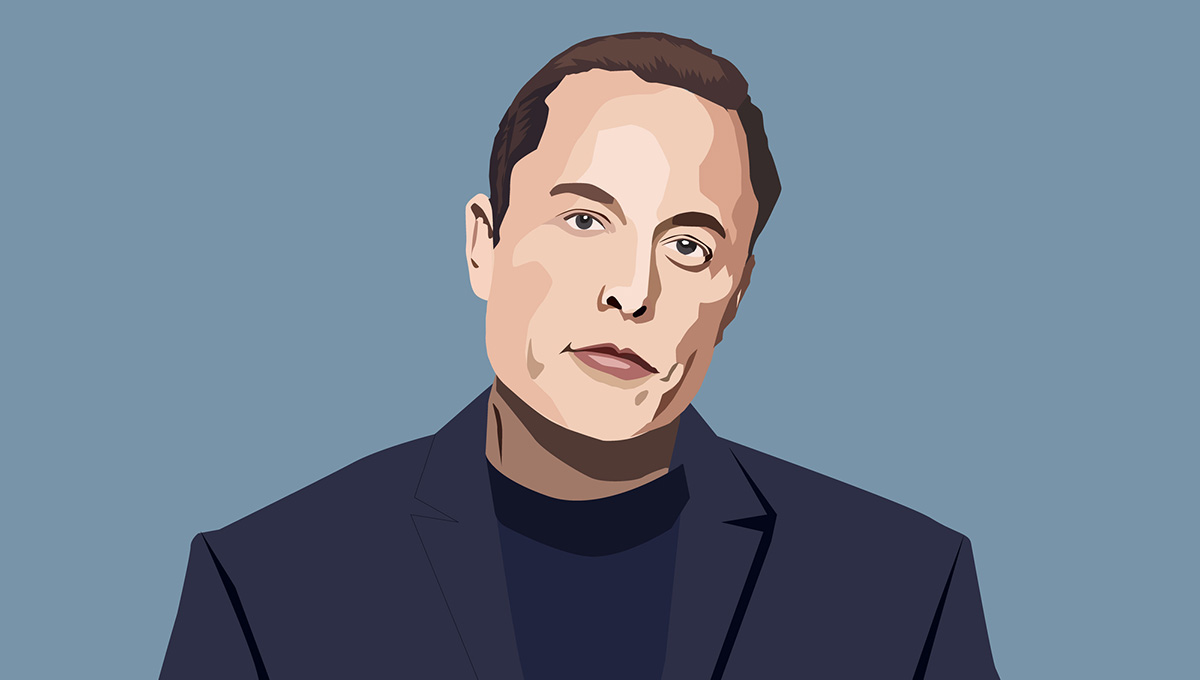
More articles:
1) Touch Typing: Learn How To Type Faster;
2) 9 Books People Read To Get Smarter;
3) Zettelkasten: Smart Note-Taking System.
15 Books Elon Musk Thinks Everyone Should Read:
- "The Hitchhiker's Guide to the Galaxy" by Douglas Adams;
- "Structures: Or Why Things Don't Fall Down" by J.E. Gordon;
- "Benjamin Franklin: An American Life" by Walter Isaacson;
- "Superintelligence: Paths, Dangers, Strategies" by Nick Bostrom;
- "Our Final Invention" by James Barrat;
- "Ignition: An Informal History of Liquid Rocket Propellants" by John D. Clark;
- The "Foundation" trilogy Isaac Asimov;
- "Life 3.0: Being Human in the Age of Artificial Intelligence" by Max Tegmark;
- "The Lord of the Rings" by J.R.R. Tolkien;
- "Zero to One: Notes on Startups, or How to Build the Future" by Peter Thiel ;
- "The Moon Is a Harsh Mistress" by Robert Heinlein;
- "Merchants of Doubt" by Naomi Oreskes and Erik M. Conway;
- "Einstein: His Life and Universe" by Walter Isaacson;
- "Howard Hughes: His Life and Madness" by Donald L. Barlett and James B. Steele;
- The "Culture" series by Iain M. Banks;
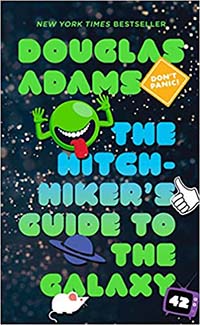
1. "The Hitchhiker's Guide to the Galaxy" (Douglas Adams)
Best Sellers Rank: #63,936 in Books
- #160 in Humorous Science Fiction (Books)
- #258 in Humorous American Literature
- #262 in Classic Action & Adventure (Books)
Amazon reviews:
"Author Douglas Adams brings us the opening book in his five-part trilogy of the Hitchhikers Guide to the Galaxy. As the book opens we meet Author Dent a human from the planet Earth who doesn't know it yet but his best friend Ford Prefect is from a little planet near Beetleguice. On one Thursday morning Author sees that the local counsel has sent bulldozers to knock down his home. But Ford is rushing to him to talk with him and take him to the local pub because they're going to need the mussel relaxant. Once Ford arrives there he talks Author into coming with him but just as they're settling in for their third pint of bear the bulldozers destroy Author's home. Ford runs after him and makes sure that he grabs a towel to take with him as the Vogon construction fleet fill the sky. Thus begins the adventure for both Ford and Author that will take them to the recently stolen Heart of Gold starship and to the planet Magrathea where Author will find out about the true origins of Earth and why two little white mice want the question to the ultimate answer of 42. This is a great book and I highly recommend reading the entire five book series."
"I have read this book many years ago and thought I would give it another read on Kindle. If you are a fan of British humor, this book should be required reading. The story is preposterous, and it is made even better with our hero handling every situation with typical British "carry on" attitude. I am now off to read the second installment."
"I loved this book. The comedy was right up my alley and the story was fun. Even better, the short chapters and rapidly changing topics kept me interested even where my ADHD would have normally cut my reading short. This book is simply superb. I’m only disappointed it ended so soon. I checked the bottom and it said I was 66% through the book, turned a few pages and found that I was at the end. The rest was supplementary information about how the movie based on the book was made, with interviews and stuff. As the movie was a bad representation of the book, I ignored that stuff."
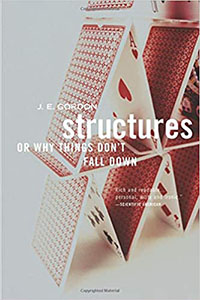
2. "Structures: Or Why Things Don't Fall Down" (J.E. Gordon)
Best Sellers Rank: #1,125,726 in Kindle Store
- #102 in Strength of Materials Engineering
- #165 in Materials Science (Kindle Store)
- #299 in Structural Engineering
Amazon reviews:
"I wish Gordon was my Strength of Material Professor. His grasp of the subject is only exceeded by his writing skills. Reminds me of Richard Feynman in his knowledge and his ability to teach a complex topic.. BTW this is on the recommended book list of Elon Musk. That's a nice endorsement."
"This book requires fairly careful attention plus at least an attempt to follow some very simple algebra. But that said, it is well worth the trouble. This book gave me more of a startling uptick in my ability to perceive and "read" the structures around me - from trees leaning this way or that old bending in the wind, to the fascinating structures of bridges and buildings. Really an outstanding, entertaining, super well written book that literally changed my life. Suggestion: without sketch paper and google search to hand I would have had a hard time soaking this one up."
"This was an excellent brief overview of stress, strain, and other general structural analyses. There are spots where the reader can tell that the book is dated, specifically where the author writes about composite materials like carbon fiber. However, the subject matter has not changed much since the date of writing as the laws of physics tend not to change. I read this book as a refresher from my stengths and statics class years ago and to learn some histories of structure design."
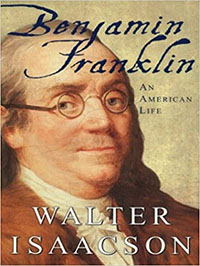
3. "Benjamin Franklin: An American Life" (Walter Isaacson)
Best Sellers Rank: #10,020 in Books
- #12 in American Revolution Biographies (Books)
- #27 in U.S. Revolution & Founding History
- #40 in Deals in Books
Amazon reviews:
"This is the third copy of this book I have purchased, having given away my other two, that how much I love it. Isaacson wrote an excellent biography of Franklin, one that I've reread a few times. I know the expression"like you were there" is overused but this book actually makes you feel you knew the real Franklin. I've been reading a lot about the younger Franklin recently, his time as an apprentice to his brother James, a printer, his self-education, his escape to Philadelphia, but this book presents the complete Franklin in a way thats reachable. Its not complicated reading, its an exciting story that makes you totally familiar with the man, warts and all."
"Walter Isaacson tackles the ultimate hyphenated man in Ben Franklin – printer, scientist, raconteur, diplomat, author, philosopher, inventor, politician, and world-reknowned icon. Founder of multiple civic organizations including a library, fire brigade, militia, hospital, and college. Tireless advocate of the common man and vocal proponent of democratic ideals and the common good. The wise sage whose voice (and signature) can be found in the Declaration of Independence and the Constitution."
"A brilliant biography by a brilliant biographer. I feel unworthy of both, and incapable of expressions suitable for such an amazing founding father, scientist, and philosophizer. Found myself wondering what America would have been like if BF had been younger at the time of the revolution. What if he had become America’s first President? How would America have changed? Would he have emancipated the slaves sooner? Would he have found a way to avert the Civil War? And what other science would he have uncovered through his keen skill at observing natural phenomena and designing experiments? All in all I am awed by BF and awed once again by Walter Isaacson."
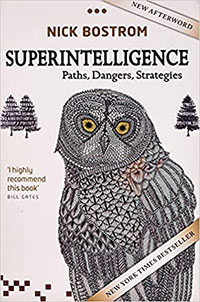
4. "Superintelligence: Paths, Dangers, Strategies" (Nick Bostrom)
Best Sellers Rank: #17,927 in Books
- #3 in Artificial Intelligence (Books)
- #16 in Artificial Intelligence & Semantics
Amazon reviews:
"I picked this book up because I have a kid at CalTech majoring in AI programming, machine learning. He seems to see only upside, no real concerns about 99% of the population being put put of work, and what I believe is inadequate apprehension about what could go wrong. Mom is a huge fan of Stephen Hawking and he was more than a bit apprehensive about the potential problems with self-learning machines. Most of the books and articles I have read on the topic are cursory or naieve. Nick Bostrom's book is fairly comprehensive and in depth. I am enjoying it as much as an excellent read in philosophy of science., as I am for his expanding the boundaries of the conversation, indeed, broaching it in many areas. I honestly do not know whether he says everything which needs to be said, but he has clearly thought it through and done a good deal of exploring, consulting, conversing ,collaborating. It is far and away the best book I have read on the topic {though there are some good pieces in MIT Technology Review as well)."
"Absent the emergence of some physical constraint which causes the exponential growth of computing power at constant cost to cease, some form of economic or societal collapse which brings an end to research and development of advanced computing hardware and software, or a decision, whether bottom-up or top-down, to deliberately relinquish such technologies, it is probable that within the 21st century there will emerge artificially-constructed systems which are more intelligent (measured in a variety of ways) than any human being who has ever lived and, given the superior ability of such systems to improve themselves, may rapidly advance to superiority over all human society taken as a whole. This “intelligence explosion” may occur in so short a time (seconds to hours) that human society will have no time to adapt to its presence or interfere with its emergence. This challenging and occasionally difficult book, written by a philosopher who has explored these issues in depth, argues that the emergence of superintelligence will pose the greatest human-caused existential threat to our species so far in its existence, and perhaps in all time."
"Probably one of the best and well written books about the benefits and the dangers of AI and the effects it could have on humanity. This book is a conversation you never had with anyone else concerning the evolutionary processes of AI and its many faceted paths it can potentially take. Just reading it reminds me of the many nightmarish possibilities that we could experience and the thought of it seems quite depressing and dystopian. Depending on what types of limits we place on AI is where things may eventually lead to. If that is possible at all. It may seem perhaps that the integration of AI and humans can only go so far and may be limited. I say this because what is available in the non-human sense of unlimited data, we then enter a realm that the limitations of humans are irrelevant, due to vasts amounts data and ever evolving technology."
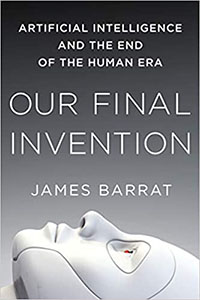
5. "Our Final Invention" (James Barrat)
Best Sellers Rank: #166,049 in Books
- #58 in Human-Computer Interaction (Books)
- #177 in Artificial Intelligence & Semantics
- #995 in Evolution (Books)
Amazon reviews:
"As a member of that crusty generation who began programming mainframe computers with punch cards in the 1960s, the phrase “artificial intelligence” evokes an almost visceral response of scepticism. Since its origin in the 1950s, the field has been a hotbed of wildly over-optimistic enthusiasts, predictions of breakthroughs which never happened, and some outright confidence men preying on investors and institutions making research grants. John McCarthy, who organised the first international conference on artificial intelligence (a term he coined), predicted at the time that computers would achieve human-level general intelligence within six months of concerted research toward that goal. In 1970 Marvin Minsky said “In from three to eight years we will have a machine with the general intelligence of an average human being.” And these were serious scientists and pioneers of the field; the charlatans and hucksters were even more absurd in their predictions."
"The book scared the crap out of me. Before reading, I was one of those who blithely accepted the common myth that AI was all beneficial, sweetness and light, etc. Now I, along with many others, have serious questions and doubts about the wisdom of humans developing autonomous AI."
"James Barrat wrote Our Final Invention in 2013, and as the book nears its tenth anniversary, one can only marvel at the author's foresight. Everyone should read this book to understand the direction the technological world is heading, and the consequences of assuming a computer super-intelligence will find any value - or the need for- the humans who created it."
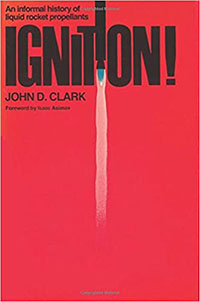
6. "Ignition: An Informal History of Liquid Rocket Propellants" (John D. Clark)
Best Sellers Rank: #6,326,140 in Books
Amazon reviews:
"This is a fascinating book if you’re curious about the history of rocket fuel or you’re going into making rocket fuel and you want to know what’s been tried before (and why it didn’t work). The author states (and I agree) that this should be required reading for any budding rocket scientist.
The author’s tone is often a wry, tongue-in-cheek take on the trials and tribulations of discovering better ways to make things go faster through rapid combustion without explosions. (As well as excellent stories regarding the subsequent explosions, of which there are many.)
Individuals with a strong grounding in chemistry will understand much in this book (the author claims he “dumbed it down”). Laypeople will have to skim through the very pithy (but well explained) chemistry (about 2/3 of the book) to find the entertaining stories and quotes.
All in all an excellent book from an author who found many ways to blow Uncle Sam’s money in pursuit of new ways to put molecules together in unstable forms."
"This is a fantastic look into the 8th world of a propulsion chemist commonly referred to as a rocket scientist. The tongue-in-cheek storytelling of the altar reflects his view on life given the fact that what he's working with has blown up so many times and almost killed them so many times he doesn't have PTSD. this also takes into account the fact that most of the chemicals the gentleman work with were so poisonous that they could kill you within a few moments of exposure.the joy of this book is learning that science can be fun if also life-threatening on a daily basis on the level of any major Hollywood motion picture filled with explosions Jared if you're a fan of a good story rocket science science in general or somebody trying to deal with the day-to-day threats on his life while trying to get the job done this book is for you. I would also recommend propulsion chemist as a potential job opportunity for any young individual looking for a career in something exciting yet terrifying"
"This book is a very entertaining look at the insane mad science of rocket fuel development in the 1950s and 60s. While we have settled on a few common rocket fuels now, like RP1/LOX and LH2/LOX, we were toying with such insane things as Chlorine Triflouride, Dimethyl Mercury, and Liquid Ozone. All to very states of cartastrophic fires, explosions and poisonings. This book is written to make you laugh and learn. But when you stop laughing you realise "holy cow, someone was burned alive screaming from contact with Chlorine Triflouride." Truly an entertaining and informative read, let's all be grateful today we aren't toying with this mad science anymore now that we've settled on a few, sane propellants"
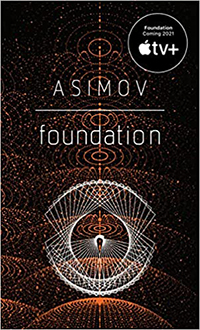
7. The "Foundation" trilogy (Isaac Asimov)
Best Sellers Rank: #17,866 in Books
- #186 in Classic American Literature
- #211 in Hard Science Fiction (Books)
- #620 in Space Operas
Amazon reviews:
"Isaac Asimov was a brilliant thinker and writer. His 'Foundation' series has been on my to-read list for a long time. I can see why this book invariably winds up on so many all time great lists. His themes incorporate religion, war, psychology, politics, and so on.
The book jacket summarizes this 66-year-old book well. It stands up well to the passage of time. The twists and surprises take the story in unexpected and interesting directions. Asimov does not waste much space developing characters. In fact, it seems to me the characters in 'Foundation' take a distinct back seat to the story direction and underlying themes. If you like action-packed Sci-Fi, this book may not be your cup of tea. But if you like big human ideas,themes, or morals; you might want to read this one."
"Asimov's Foundation books are rightly so seen as masters of the art of science fiction. The concepts, the ideas and the execution of the books is near flawless and the basic ideas have spread through many other Asimov books."
"Isaac Asimov's Foundation is a classic within the sci-fi genre. Published before there awards for the genre, Foundation remains one of the most read and most recognized stories that served to define and demonstrate the scope of the field. The tale is set thousands of years in the future when mankind has settled much of the galaxy. At this point, the "empire" is in decline much like the Roman Empire and like Rome, few noticed what was happening. Into this mix comes Hari Sheldon who created the field of psycohistory that is mathematically based in terms of plotting and predicting social evolution and its future. He bands together a small group on the fringe of the empire as a ray of hope to shepherd humanity through a period of "dark ages" that will only last 1000 years, rather than the 30,000 he calculates from doing nothing. The tale tells their story through the first several generations as they navigate successive crises that Sheldon had predicted, predicated on the civilization collapse that is ongoing."
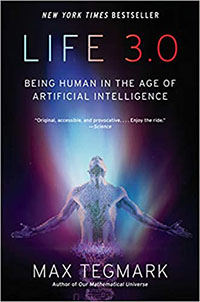
8. "Life 3.0: Being Human in the Age of Artificial Intelligence" (Max Tegmark)
Best Sellers Rank: #17,817 in Books
- #4 in Robotics (Books)
- #4 in Robotics & Automation (Books)
- #4 in Biotechnology (Books)
Amazon reviews:
"While one cannot help being taken in by Tegmark's boundless enthusiasm, the book contains essentially no substantial content that I could extract. It may have some value in increasing general awareness about the dangers of AI, as well as providing an optimistic outlook for our technological future; and for those who are utterly unfamiliar with these sorts of ideas, it provides a gentle and entertaining introduction. I might recommend it to children interested in AI, and science/technology more generally, but for serious enthusiasts: don't waste your time, skip right to Bostrom's "Superintelligence" instead."
"Max Tegmark, thank you for accomplishing the astounding feat of writing a book that will clearly delight and intrigue your fellow brainiacs, but that is also actually accessible to English majors like myself, intimidated by complex science. What an exhilarating ride!! The importance of understanding AI, the potential impact on humanity, is certainly not limited to physicists, so it is really a service to biological beings to make the subject (mostly) understandable. The topic also so quickly brings up the BIG questions . . . which continue to have no definitive answers but for which you've given us so much food for thought. I also greatly appreciated your playfulness, humility and awe. I have now purchased your book 7 times. First I downloaded the audiobook, but saw I was going to need pictures for this one and downloaded it to my Kindle. Then because with four other couples we have a monthly movie night (like a book club but with movies) and will watch "Her" at our next one, I sent copies to the other participants. This is going to be a loooooong conversation. So long in fact, that if you are reading this, I wonder if you would recommend other movies that intelligently explore this topic?"
"I'm not sure if I should call this book scary or hopeful because it seems to be both. We humans really are creating a new kind of intelligent life with great promise for going further than our biological bodies could ever allow. I am struck by feelings of great joy as well as sadness in understanding that we are a part of this wonderful process but that we will most likely be replaced. Life 3.0 also adds context for where we are now with current AI meeting so many of our needs while also taking over the very functions that make us human, sometimes for the narrow purposes of selfish people putting their short term gains ahead of everyone else."
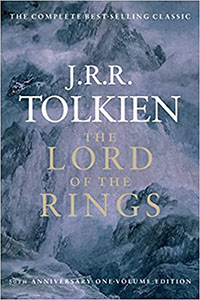
9. "The Lord of the Rings" (J.R.R. Tolkien)
Best Sellers Rank: #199,672 in Books
- #714 in Teen & Young Adult Classic Literature
- #947 in Dragons & Mythical Creatures Fantasy (Books)
- #1,977 in TV, Movie & Game Tie-In Fiction
Amazon reviews:
"The hard-copy versions look nice and all, but I wanted to know more about the Kindle edition. And I wasn't looking for reviews of the story. That's been the subject of glowing praise for decades. I got tired of trying to find a review that would answer the only question I had. Couldn't find one, so I finally broke down and BOUGHT the Kindle one-volume edition. And the answer is: Yes, the table of contents is all bundled together at the beginning, as opposed to having a separate T-o-C for each "volume" (stop sneering, I've seen other one-volume e-books where you have to skip through the whole first section to get to the table of contents for the second section). More importantly, the T-o-C actually works. That's right, I can go straight to any chapter by tapping that chapter on the T-o-C (again, other e-books had a static T-o-C where no amount of tapping would take me anywhere and I had to keep flipping pages to get to the chapter I wanted). Everything else seems to be functioning without problems. Dictionary, highlighting, synching between my Kindle and my phone, etc., all work perfectly. And in addition to being about half the cost of the three separate volumes, the one-volume edition helps to keep the scrolling at a minimum when searching through my library."
"What can you say about a classic? I'd never read these books all the way through before, and was determined to try, despite remembering what I had read as being tedious and somewhat purple-prose-ish. I apparently remembered wrong - coming back as an adult, these are beautiful books, very well-written and of course true epic fantasy. It may be that my tastes have changed, or just that I've matured, but these will definitely be reread many times. My only issue is that with the Kindle version, the footnotes seemed to be messed up. Many of them only bring up a page number (with no link), which may be how it was in the original books, but others seem to apply to footnotes further down the page, or just not at all to the thing they're noted from. Frustrating."
"I'm sobbing. I can't believe it's over! What a wonderful, beautiful world. What a grand adventure and dear, dear friends. It is not lost on me that the little people, the halflings, were the heros. I'm just in awe of the beauty, the danger, the fear. First, let's not overlook the fact that it is little people who are off on a quest to save the world and do big things. Little people can be translated in many ways either children or even those of us adults with seemingly little power in our own often very evil world. This idea gives us a lot to think about. Second the length: I have a theory about this, it's the same for Moby Dick, the length mimics the very quest. Adventures are not quick, easy travels. Much effort must be made and long eons of time devoted to worthwhile deeds. We mustn't hurry or be hasty. We must slow down and enjoy, even in the darkest, scariest of nights, the music, the myths the poetry, our history, the diversity and company of each other and of nature. Tolkien, or his publisher, gave us steps to make the journey easier: 3 books, each divided into two parts, each part being approximately 200 hundred pages. Easy chunks to chew, savor, swallow and digest. Lastly, who would dare to put pen to paper after reading one of the greatest things written. How sacrilegious is that? Now, here's what I hate: what in the name of God, made Peter Jackson think the story needed any improvement or that he was worthy of adding to it. I've heard about the movies having scenes and situations NOT in the story. No, no, no that did NOT happen. The story is perfect, just perfect the way it is."
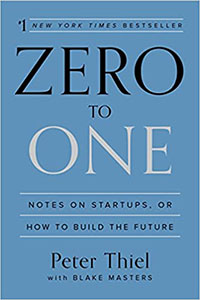
10. "Zero to One: Notes on Startups, or How to Build the Future" (Peter Thiel)
Best Sellers Rank: #3,557 in Books
- #4 in Economic Policy
- #4 in Economic Policy & Development (Books)
- #6 in Venture Capital (Books)
Amazon reviews:
"This book has been on my Kindle for years and I had heard great things about it, but never took the time to read it until finishing Alexandra Wolfe's book Valley Of The Gods about the Thiel Fellowship (which is worth a read). I was a bit skeptical owing to Peter Thiel, who is tremendously successful but also a famed contrarian with different political leanings from mine. However, after reading this book, I can say it is one of the top 3 most impactful books I have ever read. As an economics major who has worked in corporate America in the financial services sector for 20+ years, Thiel's description of our economy and society is compelling. His insights into how to create something of true value where nothing previously existed - 0 to 1 - are tremendously valuable, particularly in comparison with most of us who work towards improving what already exists - going from 1 to n. Standard economic theory has been solely tested over the past 25 years with the tech book and Great Financial Crisis as well as globalization and our turbulent times and politics today. Although written in 2014 based on lectures by Thiel at Stanford University in #012, the book remains highly relevant in 2020 and really foreshadows much of what has happened over the last 5 years. Simple, quick and easily accessible, my copy is marked up with tons highlights and notes. You won't regret making the investment in time reading this book, but be prepared to be challenged and bring an open mind to refining your own views, regardless of whether you wholeheartedly agree or disagree with Thiel."
"This is an excellent book. Not many people can be entrepreneurs, but I believe this book could inspire many and it can certainly guide one to a more open-minded approach. Peter Thiel shows us that unconventional thinking (i.e. zero to one), is absolutely required to succeed with a new business. Conventional thinking (for instance that competition is unavoidable (if you have something proprietary a la apple, it IS AVOIDABLE) , that competition is wonderful and necessary {but actually it is NOT}), is the linear approach (go from 1 to 1.1). Conventional means copy others and when you do that you have to compete mainly by cutting prices. The leading businesses truly innovate (and everyone else follows or stay behind). I started reading a library copy but realized I want to own it because I have to read it slowly many times like a good wine. The copy that I received is in great condition; good deal, thanks!"
"There are two primary things that I learned from this book, among many smaller lessons. First, it made me reinterpret conventional theories about how the marketplace works - how technology is more important than globalization since globalization simply multiplies the existing benefits of technology - which is unsustainable in a scare resource world, whereas technology is the actual driver of wealth creation - creating ways to innovate new products and services to find optimal uses for existing resources. This is an important thought to keep in your mind when hearing the endless benefits when the buzzword globalization is mentioned."

11. "The Moon Is a Harsh Mistress" (Robert Heinlein)
Best Sellers Rank: #811,894 in Books
- #9,644 in Leadership & Motivation
- #52,229 in Science Fiction (Books)
Amazon reviews:
"This is one of the best books by one of the best Sci-fi authors ever. His stories are about the people, with technology or unusual geography (in this case the cities of the moon) acting as the backdrop. Follow as Mannie Garcia, a 3rd generation lunar exile tells us the compelling story of the war for Lunar Independence. Meet his friend Mike, the computer with a sense of humor, plus a great cast of other characters. After reading some of the other (bad) reviews, I wanted the point out that the book is written from the first person by someone who speaks broken English, living in a time and place where the main language was broken English. It is meant as part of the setting, but might be an issue if you can't see past it. But if you can, the story is well worth it!"
"I just try sit down read Heinlein Moon Harsh Mistress book. Thought I got defective copy. Hate his chopped English (like I'm using right now). Could not finish first chapter. Maybe chopped English end after first chapter. Check random pages in rest. Nope. All written same way. Hate this style. Don't care why chose do that way. And don't need libertarian insight from him. Already know libertarianism, met, conversed with great libertarians. Some say I have reputation as left libertarian. Written on anarchism. Too. But I don't give damn. Find style too taxing. Not worth effort to read book like this. Put book down. Will give away."
"The very best Robert Heinlein book ever. I've been waiting for this to come out in ebook format for a long long time and now I can take it with me and introduce friends to a classic. The penal colony on Luna revolts and the resulting war between Terra and Luna is horrendous. Heinlein illustrates the first use of kinetic strike weapons and the propaganda use of food for a starving Earth. He details how personal integrity and personal freedom must interrelate. Read and enjoy and think"
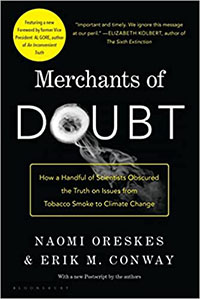
12. "Merchants of Doubt" (Naomi Oreskes and Erik M. Conway)
Best Sellers Rank: #15,633 in Books
- #95 in History & Philosophy of Science (Books)
- #463 in Philosophy (Books)
Amazon reviews:
"This is an excellent, and surprisingly easy book to read. Oreskes, and Conway document that the "American Tobacco Institute" was a fraud from the start with bogus "studies" that "proved" nicotine was not addictive, and did not cause cancer. Then, the fossil fuel industry used the same scheme (even some of the same "experts") to prove there was no medical threat from leaded gasoline, or smog. It was in the late 1970s and early '80s that climate change was added to the list that burning coal and petroleum "didn't cause."
"
"A prescient book -- Although it was written to explain how doubt about science has been sown since the 1970s, what it really explains is how the American public's trust in expertise has been so eroded that we arrive at the current political situation. Reading this book has helped me understand how we got to 45."
"If you want to understand why the government has been so slow to take action against major threats to public health—from tobacco and acid rain to the ozone hole and now climate change—this book is must reading. It turns out a handful of brilliant scientists extremely well connected in Washington but with no expertise on any of the issues under debate influenced the government far more than the consensus view of hundreds of experts. I always wondered what motivated this highly vocal minority--often the same people decade after decade. Why don't they care about people or the planet? The authors reveal that idealogical biases based on grossly simplistic, outdated ideas left over from the Cold War era are what has driven the main players to deceive themselves and us. Actually, it is not clear that they deceived themselves, but it is clear that they felt the ends justified the means--even if that meant grossly distorting evidence, cherry picking facts, founding numerous think tanks to churn out press releases aimed at misleading the public., and undermining confidence in the entire scientific enterprise."
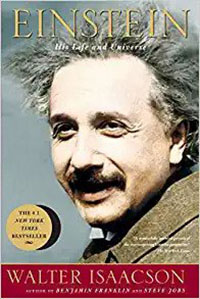
13. "Einstein: His Life and Universe" (Walter Isaacson)
Best Sellers Rank: #10,879 in Books
- #11 in Relativity Physics (Books)
- #42 in Scientist Biographies
- #66 in History & Philosophy of Science (Books)
Amazon reviews:
"What can I say? I have not been a reader of biographies, so I have no basis of comparison. I bought this book because the writer was touted on TV for his new biography of DaVinci, and they mentioned his very popular biography of Einstein. I have always been interested in Einstein, so I decided to tray this. I do not have the right to say that this is a masterpiece because, as I've said, I have not read biographies. I thought I might have trouble getting into it. Not even close! I was totally absorbed with it. Isaacson gets you not only into the science of the man, not only into the facts of his life, but into the warmth, humanity and humor that was so characteristic of him. I totally loved this book and recommend it to anyone who has any interest in knowing about the great genius of Albert Einstein and, at the same time, reading a totally absorbing book."
"There is perhaps no greater scientist to have ever lived. His name is known internationally. Even if people don't completely understand his work, they respect his contribution. This is the third book I've read by Walter Isaacson, and I must say, like "The Innovators" and "Steve Jobs," "Einstein" is a wonderful read."
"Having recently finished Mr. Isaacson’s Leonardo da Vinci which I thoroughly enjoyed, I decided on his Einstein book. Reading Walter Isaacson is like listening to a good friend telling you a very well researched and seamless story. He touches on difficult themes eloquently and elegantly. I’ve only read about 30 pages and already I finally understood Einstein‘s theories to a better degree than ever - and not even realizing it. I will update when I finish the book; however, I can already tell I will enjoy this one as well."
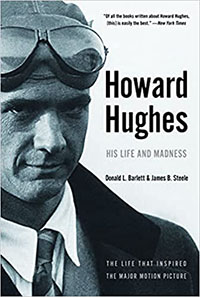
14. "Howard Hughes: His Life and Madness" (Donald L. Barlett and James B. Steele)
Best Sellers Rank: #208,139 in Books
- #817 in Business Professional's Biographies
- #1,794 in Rich & Famous Biographies
Amazon reviews:
"Wonderful in depth look at a very complicated man who’s mental health struggles kept him from reaching his full potential time and again. It was also sad that throughout his life people were willing to enable his behavior rather than seek ways to help him."
"After watching the movie AVIATOR about Howard Hughes' life, I had to know more. This book is extremely detailed as it goes through his many business deals in his life to his ultimate tragic end. I am fascinated by Hughes and this book gave me more than I could have expected. I wanted to know more about his personal life than his business dealings and his financial status and so I bought another one. He certainly was a poor soul who was tortured by his mental illness and having so much money it allowed him to create his own mental hopsital where he could go deeper into maddness and this book shows you exactly how that happened."
"This is by far he best in depth biography of such an interesting man. Very hard to put down once you get started. the further I get into it the more intrigued I am. There should be a sequal to the "Aviator" This tells every detail of his illness and victories. People need to see it on the big screen with Leo returning as HRH. The most captivating story in US History in my opinion"
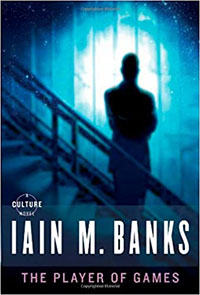
15. The "Culture" series (Iain M. Banks)
Best Sellers Rank: #54,304 in Books
- #515 in Hard Science Fiction (Books)
- #1,103 in Contemporary Literature & Fiction
- #1,613 in Space Operas
Amazon reviews:
"There is no major way to explain the plot any further due to its complexity. This book was a fast read and I think the writing is superb. Needless to say I recommend the two culture novels I have read so far and I certainly shall be reading more in the series."
"This book is different from others along similar lines in that both societies are radically different from ours. The featured civilization, the Culture, uses neural networks for biological people, like our protagonist Gurgeh, to communicate directly with cybernetic people. The other society is the Empire of Azad, which is trisexual society, ruled by the Apices, who are bisexual, taking advantage of both the males and females, who they basically treat as slaves. The Empire takes its name from their game of A sad, which is to chess what chess is to rock, paper scissors.
There was a mention of a labyrinth prison, which I took to be a Chekhov's gun, something that the protagonist would have to deal with later on. It is, instead, a metaphor for Azadian society, which is a dictatorship, where even the highest members of the ruling class can be summarily tortured and executed. Sometimes the torture and execution are the same act.
The author shows us great detail of the Empire, from Imperial palaces to red light districts to slums. The climax is set on a world with an ever raging fire which sweeps around the planet. The author shows great imagination in constructing and describing these places.
I hadn't read the first book at the time of this writing, but I was able to grasp much of the workings of the Culture. I will have to read the first book as soon as possible."
"Ahoy there mateys! Several years ago, I was lamenting that there were no standalones that were somehow intertwined in one universe or world. Me brain is usually a sieve and lots of time in-between books in trilogies and such means that I lose details and sometimes have to start the series over. I wanted the effect of extreme world building with a tied-up story in each book. The First Mate suggested the Culture “series” in which every book is set in the same universe but all can be read as standalones and in any order. And sci-fi to boot. Arrrr! So I began with the novel consider phlebas which was Bank’s first Culture novel. Have read it twice now and loved it even more the second time. So eventually I bought this book which was Bank’s second written Culture Novel and the First Mate’s favorite."